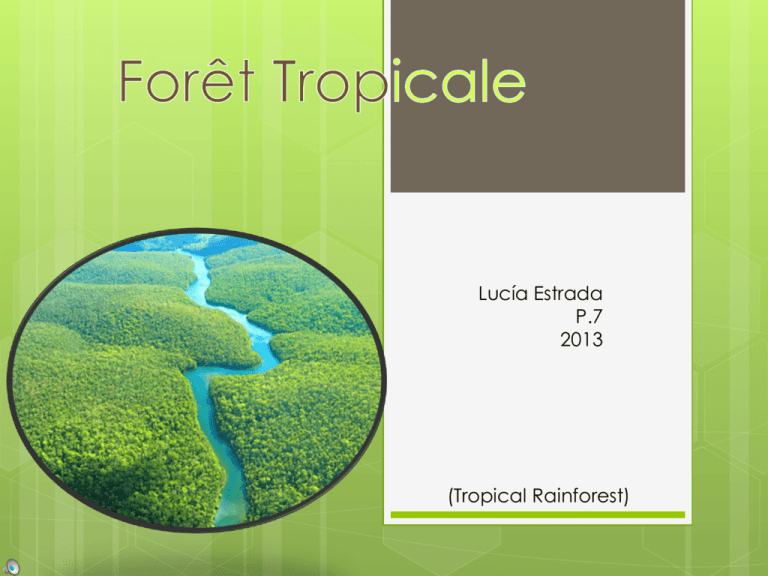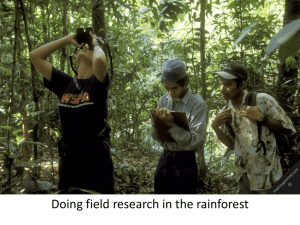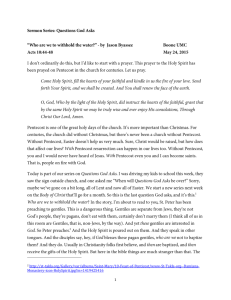ecology final project - ASFM Tech Integration
advertisement

Lucía Estrada P.7 2013 (Tropical Rainforest) The best place after Earth… The newly-found planet Fôret Tropicale, is the best option for you and your family, friends and relatives to live in. Discovered by the famous astronaut Lucía, Fôret Tropicale offers the best for all human life. There are many animals, not only to mention they are beautiful and exotic. In no other place they can be found like the capuchin monkey and the pacific tree frog. The climate is amazing, during the whole year it gets between 35ª C and 25ª C. This is one of the reasons this planet is paradise, during the whole year there is warm weather and during the night it doesn’t get either hot or cold… two in one! The days last 22 hours and the year lasts 363 days. There is a lot of sunlight and rain in this planet, about 125 to 660 cm of rainfall per year. In fact, Fôret receives so much of it that plants grow up to be stronger and longer. It is very humid since there is a lot of rain, humus covers most of the floor due to decaying organisms. The soil is mostly not fertile but there are parts in which it is. There is enough fruits growing in trees, so no plantation would ever be needed. Fôret Tropicale, the best place after Earth. The Climate in depth As you have possibly noticed. Fôret Tropicale is in other words a tropical rainforest. From the word “rainforest” you can clearly know that it rains a lot. In day time the climate ranges from 30 to 35 C. At nigh, the weather drops. It is usually from 20 to 25 C. Sometimes, there will be no rain but it will eventually come back. This, helps drastically with the growth of plants and vegetation. There is not really any seasonal change. It stays warm all of the year and it also rains a lot most of the year. Landforms: There are many rivers, flood plains and many mountains. There is vegetation in mostly all of the landforms filling it with a lot of green. Also, there are many valleys and wetlands. Food Web key: Decomposers Scavenger Third Level Consumers Second Level Consumers First Level Consumers Producers Food Web Biotic Factors: Normal Scientific Humans Homo Sapien Flower from orange tree Citrus Sinesis L. Osbeck Orange Seeds Citrus Sinesis Mule Deer Odocoileus Hemionus Pacific Tree Frog Pseudacris Regilla Black Tipped Jackrabbit Lepus Californicus Western Whiptail Aspidoscelis Tigris Termites Termitoidae Verilion Waxcap Mushroom Hygrocybe Miniata King Vulture Saroramphus Papa Red Breasted Nuthatch Sitta Canadensis Pika Ochotona Ringtail Lemur Catta Coyote Canis Latrans Mountain Lion Puma Concolor Bobcat Lynx Rufus Symbiosis Click on buttons! Mutualism Parasitism Commensalism Mutualism The relationship between a Capuchin monkey and flowering trees is considered mutualism because monkeys feed on the nectar from the trees. The pollen from the tree gets on the monkey´s face and is eventually transferred to other plants. Back to symbiosis Commensalism In Fôret Tropicale, The relationship between plants and frogs is considered commensalism because frogs use plants as shelter and as a water source but, the plants do not get either benefited nor affected. Back to symbiosis Parasitism The relationship between the Phorid fly and the leaf-cutter is considered as parasitism because when the leaf-cutters are collecting leafs, the Phorid flies attack them and ley eggs on the leaf-cutter ants heads. The flies are the parasites and the leaf-cutters are the hosts. Predator / prey relationships A bobcat preys on a Pine marten as a part of their daily diets. Pine martens can climb high up in trees and be very fast, in order to catch them, bobcats must be very smart. Predator / prey relationship A mountain lion preys on a black tipped jackrabbit as a part of its diet since it is a very healthy meal and can be found in the rainforest. Predator/prey graph The struggle… Mountain lions, compete with humans for territory and food. Humans knock many trees down which means that the animals mountain lions prey on, don’t have a home. Mountain lions then, do not have as many resources to eat nor to shelter within. Sources: Info: Strahler, Arthur N.. "Rainforest Biomes." blue planet biomes . N.p., n.d. Web. 25 Nov 2013. http://www.blueplanetbiomes.org/rainforest.htm. "tropical rainforest." wikipedia. wikipedia, n.d. Web. 25 Nov 2013. <http://en.wikipedia.org/wiki/Tropical_rainforest>. Baptise, Melissa. "Symbiosis." Melissa1234. weebly. Web. 25 Nov 2013. <http://melissa1234.weebly.com/symbiosis.html>. Pictures: http://www.bigelow.org/edhab/images/food_web.jpg http://blog.lib.umn.edu/walsh414/chelsaewalsh/capuchin-monkey-wallpaper--1080x960.jpg http://syniq.co.uk/wp-content/uploads/2013/03/AngryMountainLion.jpg http://www.redcliffsdesertreserve.com/wp-content/uploads/2009/12/Black-tailed-JackRabbit.jpg http://nimbuseco.com/wp-content/uploads/2013/01/Deforestation-Amazon.jpg http://2.bp.blogspot.com/_W90V87w3sr8/TNsGpcyhjQI/AAAAAAAAAJ4/8sY9md0zkSg/s1600/ bobcat_lying%255B1%255D.jpg http://ih1.redbubble.net/image.7407967.6575/flat,550x550,075,f.jpg http://cdn.orkin.com/images/flies/phorid-humpbacked-fly_187x187.jpg http://www.desktopas.com/files/2013/07/tropical-rainforest-unique-frog-wallpaper-640-x480.jpg http://www.fredhoogervorst.com/oni.app/local/upload/02936.jpg http://www.rainseason.net/wp-content/uploads/2012/01/Temperate-Rainforest-FoodWeb1.jpg








